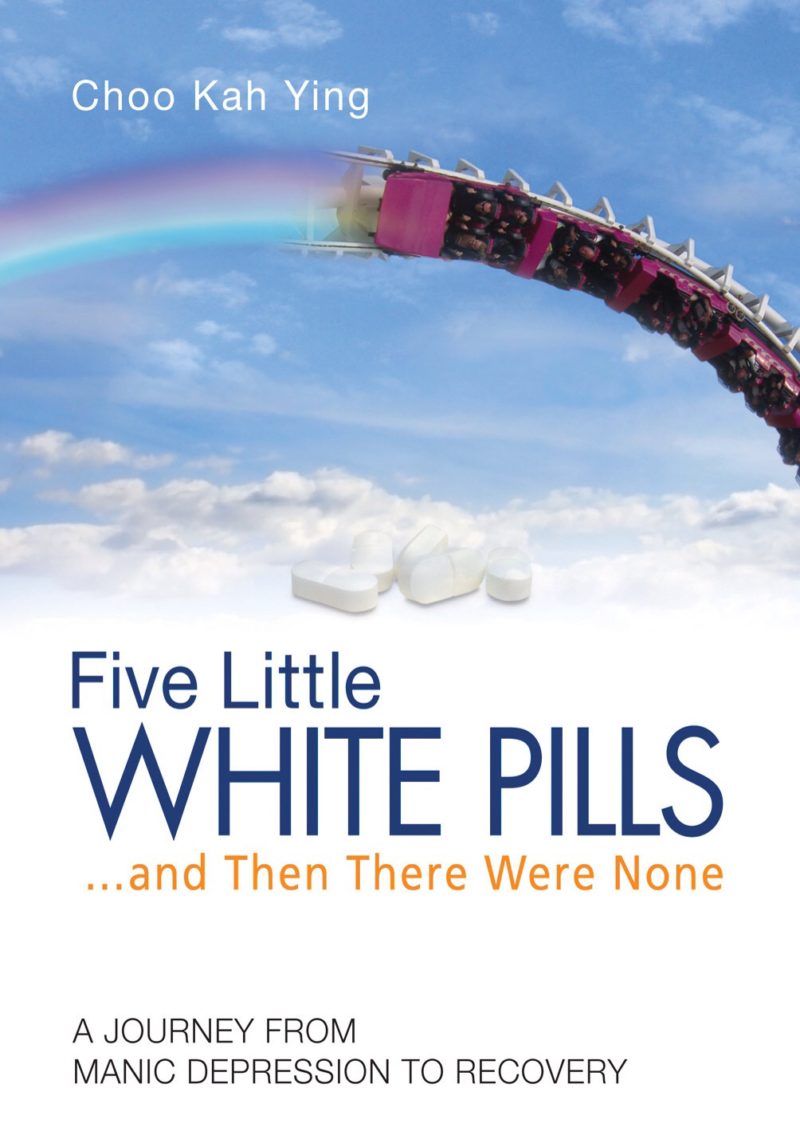Five Little White Pills by Choo Kah Ying
Five Little White Pills is a beautifully written book by Choo Kai Ying. In it, she describes in detail her struggles with bipolar disorder, which she refers to as manic depression (MD).
The first half of the book begins with her university life as an undergraduate in Australia. It ends with her having her son and raising him in his early years after she moved to America. Throughout this journey, she paints a clear picture of the exuberant highs and the depressive lows that someone with bipolar disorder experiences.
We feel for her during her inaugural visit to the psychiatrist after her first suicide attempt. Consumed by her depression, she could only watch in fury as her parents discussed her condition with the psychiatrist as though she wasn’t there. Yet, when it was her turn to speak, she could barely answer any questions the psychiatrist posed. That was how debilitating the depression was. In that dark period, she struggled with day to day living and the reader can empathise with her helplessness.
Gradually, the depression gave way to hypomania where it seemed as though she had recovered. Back to her friendly and jovial self, her family was relieved. However, the hypomania soon gave way to full-blown mania where she vented her frustration and anger, repressed for many years, on her parents, whom she felt had stifled her growth as a person.
And then, back came the depression.
Up and down she went.
In one manic episode, she moved to America and spent all her money she had within the short span of one month. The pendulum continued swinging, alternating between mania and depression and it was not until she had her son that she decided to take her medication so that she could take care of her newborn son – Sebastien.
The second half of the book covers some methods she uses to deal with her manic depression without medication. This next section should be read with caution, and you should consult your psychiatrist before stopping any medication on your own.
It was a failed attempt at securing insurance for herself that prompted her to take the first steps to wean herself off her medication. It took some time, but eventually, she was medication free. As such, the author wishes to propose a third way for patients, that is, to be medication free, instead having a lifelong dependence on them.
I felt that the first half of the book was very well-written, and as someone who is diagnosed with bipolar disorder, I can fully relate to her experiences. Her second half however, was slightly repetitive, but interesting nonetheless. I have not heard of anyone advocating to be medicine free and it is rather novel. Although I am not in any capacity to judge, I’m happy to note that she doesn’t discount the fact that medication does stabilise one’s condition. In addition, she points out that if her condition deteriorates and if her alternative therapies do not work, she might still turn back to medication.
Recommended For:
This is one book that people who have been diagnosed with bipolar disorder and their caregivers should really consider reading. Anyone who wishes to find out more about bipolar disorder should read it too.
Where To Get:
You can purchase the book from Amazon (http://www.amazon.com/Five-Little-White-Pills-There/dp/9814222801), as an e-book (http://www.armourpublishing.com/?product=five-little-white-pills-by-choo-kah-ying-3) or get the paperback through Armour Publishing (http://www.armourpublishing.com/?product=five-little-white-pills-by-choo-kah-ying-2). Alternatively, you could borrow it from your nearest Public Library as most branches carry this title.
Written by Rachel T. for The Tapestry Project SG

